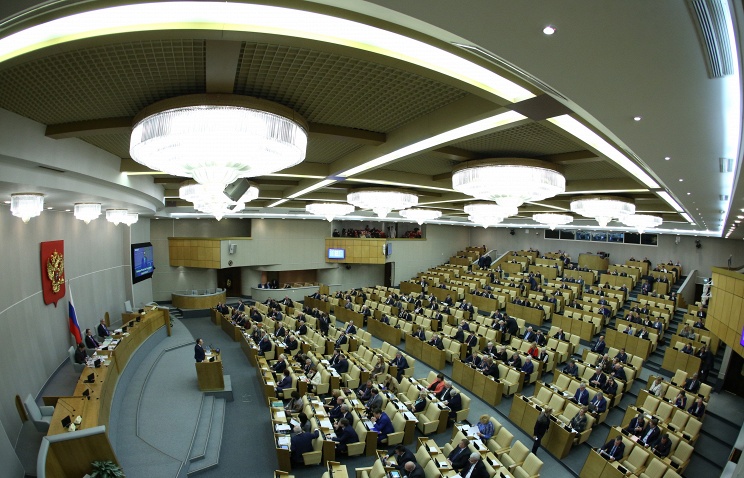
Russian Lawmakers Introduce New Repressive Legislation
Publication: Eurasia Daily Monitor Volume: 11 Issue: 214
By:

Russia has introduced or is planning a series of new repressive legislative acts. First, lawmakers have prepared amendments to a bill that will define as “undesirable” any foreign or international organizations that “present a threat to the constitutional order of the Russian Federation, defense of the country and the security of state.” Parliamentarians Aleksandr Tarnavsky of the Just Russia party and Anton Ishenko of the ultranationalist Liberal Democratic Party of Russia (LDPR) initiated the bill to guard against the possibility of a color revolution or the instigation of inter-ethnic or inter-religious conflicts in the country. The bill also contains punishments for Russian citizens found aiding such foreign organizations, ranging from fines of 300,000–500,000 rubles ($5,600–9,300) to imprisonment for 2–8 years (newsru.com, November 27). In total, the law represents a significant extension of the provisions contained in the “Foreign Agents Law” of 2012 and arguably further repression of democratic forces in Russian society.
This development builds on the passage, in early November, of a bill restricting the foreign funding of political parties. That new law steeply increased fines for accepting foreign funds in the planning of an election campaign, with the new fine for some offenses being as high as one million rubles (about $18,600). In defending the bill, the deputy head of United Russia (UR), Franz Klinzevich, said that “the aim is to exclude any possibility of foreign influence on the organization and conduct of the electoral process… [This] will [finally close the chapter] on the 1990s, when many serious elections occurred with lesser or greater foreign influence” (TASS, November 14). Admittedly, many countries try to limit the influence of foreign powers on domestic elections. But the latest Russian moves stand out due to the government’s persecution of international non-governmental organizations (NGO) under the pretense that they represent a potential “fifth column” in Russian society. Furthermore, they add to the government’s pre-existing crackdown on freedom of expression in Russian society (see EDM, March 18).
Indeed, the November law on election financing from foreign sources goes hand in glove with an increase in state funding for registered Russian political parties. In many ways, the four main established parties (the LDPR, UR, the Communist Party of the Russian Federation [CPRF], and Just Russia) are effectively “ghost” parties, organized by the regime to offer the illusion of choice to voters and make elections seem more legitimate (see Thomas Remington in Stephen K. Wegren, Return to Putin’s Russia, 2014). As in many other countries, election campaigns in Russia are expensive, and competitive financing is a prerequisite to a credible run. But by limiting foreign funding and making the domestic political parties even more dependent on the Russian state, the regime gains more powers to squeeze genuine competition out of the political process.
A third initiative, the law on “state biometric registration in the Russian Federation,” shows potentially repressive tools aimed at the individual level in Russian society. This bill, recently signed into law by President Vladimir Putin, will require all foreigners coming into the country from December 10, 2014, onwards to be fingerprinted as well as have a visa for their visit. The bill was the initiative of LDPR member Roman Kudyakov. VTSIOM public opinion polling shows wide majorities within Russian society in favor of the bill (rbc.ru, November 25). The aim of the bill is purportedly to protect Russian values and prevent foreigners from provoking ethnic or religious strife in the country. But the similarities in the language between the bill defining “undesirable foreign organizations” and the law on biometric registration suggest they are both part of a single agenda.
The Russian regime is also planning to collect more information about the lives of its citizens. First of all, all Russian nationals over the age of 12 will be required to submit fingerprints with their application for internal passports as of the start of 2015. Other plans include mandating new plastic “identification cards,” which, by 2016, will replace the internal passports that Russians currently are required to carry. The cards will carry the owner’s picture as well as certain biometric information, thus constituting a type of non-replicable electronic signature. These biometric identification cards will be trialed beginning January 1, 2015, in the annexed Republic of Crimea and Sevastopol city, as well as Krasnodar Krai and Rostov Oblast. Notably, these are the Russian regions located closest to Ukraine (cnews.ru, June 30). And it bears noting that the fact that these cards are specifically being tested in the newly-annexed territory of Crimea is a symbolic means for the government to directly define the people who live there as Russian citizens.
Biometric data in personal identification documents is purportedly designed to make it harder to forge official documents. Indeed, many countries use such biometric identification cards as part of an overall strategy toward combating international terrorism. But many civil rights groups worry that in the Russian Federation, they will effectively increase the amount of data on ordinary Russian citizens that will become easily accessible to the state (mk.ru, December 23, 2013). Clearly, Russia seems intent on finding effective ways to control its own population and to guard Russian society against the democratic “contagion.”




